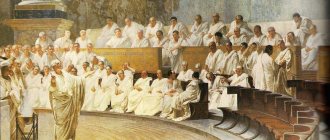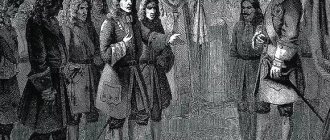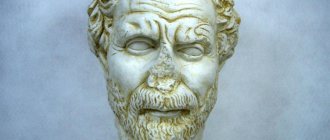The concept of legal rhetoric
Definition 1
Legal rhetoric is a set of skills and abilities of a lawyer in preparing and delivering a judicial speech, conducting conversations, advising clients, and participating in negotiations. Legal rhetoric is understood as methods of persuasion, various forms of linguistic influence on the audience to obtain the desired effect.
Rhetoric, or oratory, is a philological science about the art of public speaking in front of an audience, studying ways of constructing artistically expressive speech. A good speaker is distinguished by accuracy, clarity, purity of speech and extremely informative language. The practice of communication determines the subject of rhetoric as a theory of communicative activity.
Are you an expert in this subject area? We invite you to become the author of the Directory Working Conditions
The most well-studied and vibrant side of legal rhetoric is the analysis of texts of lawyer’s speeches and judge’s decisions. A large part of the subject of legal rhetoric is the process of preparing arguments, grounds, conclusions, and formalizing the characteristics of the content of the case for subsequent presentation in a lawyer’s speech or a court decision.
Legal rhetoric is closely interconnected with various branches of law and philology, and is an important applied section of scientific rhetoric. Legal rhetoric depends on the methodology and subject matter of the systematic discipline. Conviction is the subject of legal rhetoric in emerging legal relations.
As a scientific discipline, legal rhetoric explores the entire scope of problems associated with the preparation and provision of evaluative conclusions about legally significant facts in the process of their research and legal decision-making. Specific legal and philological approaches to the study of legal rhetoric are legitimate if they are consistent with the rhetorical method of research. The scientific methodology of legal rhetoric is closely related to the methodology of law and the general methodology of the humanities.
Finished works on a similar topic
Course work Legal rhetoric 490 ₽ Essay Legal rhetoric 270 ₽ Test paper Legal rhetoric 230 ₽
Receive completed work or specialist advice on your educational project Find out the cost
In those same years there was another famous lawyer - Gaius Scribonius Curionded. Cicero called him a truly brilliant speaker, and Curio’s speech in defense of Servius Fulvius on incest was a model of eloquence.
The judicial speeches of Mark Antony (143-87 BC) had a political overtone. The main weapon in his defense was pathos. Anthony had the ability to instantly assess the situation and, possessing the gift of improvisation, resort to insinuation, now to entreaty, now to restraint, now to inciting hatred.
Crassus was a decidedly unattainable judicial orator, according to Cicero's characterization. His speeches were distinguished by careful preparation. This concerned primarily legal validity, as well as stylistic elegance. Cicero called him "the best lawyer among orators."
The last prominent representative of the pre-Ciceronian period of Roman judicial eloquence was Quintus Hortensius Gortal. Hortensius's speech, always well-executed, elegant and accessible, captivated listeners with the nobility of his thoughts, precise and appropriate choice of words and constructions. Clarity of speeches was achieved by the fact that the speaker skillfully highlighted the main points, analyzed and challenged the arguments of the opposing side, and at the end presented new, indisputable arguments. Hortensius introduced two techniques that no one else had: a division, where he listed what he would talk about, and a conclusion, in which he recalled all the arguments of the enemy and his own.
Hortensius's voice was distinguished by pleasantness and evenness, his manners by dignity, his gestures by animation. Each of his appearances in court caused delight among listeners.
All the best that ancient Roman oratory achieved is concentrated in the oratory of Marcus Tullius Cicero (106-44 BC). Cicero wrote: “There are two arts that can elevate a person to the highest level of honor: one is the art of a good commander, the other is the art of a good orator.” Gifted by nature, he received an excellent education: he studied Roman law with the famous lawyer Scaevola, studied dialectics - the art of argument and argumentation, became acquainted with Greek philosophy, studied the oratory of the Greek wordsmiths, and studied it with Crassus and Antony.
But Cicero brought labor to the forefront. He worked hard on his voice to eliminate its natural weakness and give it a pleasant sound and strength. He always carefully prepared for delivering speeches and constantly improved his oratory skills. Cicero considered ethics and logic, philosophy, history and literature to be the most useful for an orator, since knowledge of logic helps to logically construct a speech correctly, knowledge of ethics helps to choose the technique that will cause the desired reaction in listeners. Philosophy, history and literature make what is already known interesting.
Cicero considered the most important conditions for success to be the conviction of the speaker himself and the desire to convince the court, and the decisive factor in the speech of the speaker was knowledge. If the speaker does not know the matter well, he will never be able to convince the listeners, no matter how skillful he may be; knowledge “gives content to eloquence, material for expression.” The speaker, in his opinion, must select material and evidence and be able to arrange them.
Cicero attached great importance to the arrangement of material (expositio). He developed a composition of judicial speech that ensured the easiest possible assimilation of the material. The speech consisted of six parts: 1st part - an introduction, which should arouse sympathy for the speaker, focus the attention of the listeners, and prepare them for the solution that the speaker will propose; 2nd part (Partitio) - outline of the speech, in which he clearly indicated the main provisions of the defense and put forward the thesis; Part 3 (Narratio) - a story about how the crime happened. Cicero considered the 4th part of speech to be the most important part - evidence (Probatio). To prove this, the speaker used facts of two kinds: some of them should act on the minds of the listeners (argumentum); others - to influence feelings, which is especially important at the end of a speech. Then came the 5th part (Repetitio) - a repetition of the decisive arguments so that they are better imprinted in the minds of the court. And the speech ended with a summary (Peroratio).
The main strength of Cicero's speeches is their content, the ability to select strong evidence, and the logical arrangement of material. He gradually and purposefully smashed all the attacks of his opponents, trying not so much to win as to convince.
The deep content of Cicero's speeches was matched by a bright form. All visual means were used and “scattered throughout the speech wisely”; his pathetic conclusions with rhetorical questions were especially strong. Cicero wrote: “To set hearts on fire, speech must glow.” And all his judicial speeches, strong in argumentation, amazing in form, charmed and subjugated his listeners: he knew how to arouse in them a feeling of compassion for the defendant, he knew how to confuse the enemy with a witty remark, and make the judge smile. Quintilian assessed Cicero’s oratorical skill in the following way: “Heaven sent Cicero to earth, apparently, to give us an example of the limits to which the power of the word can go... With complete justice, his contemporaries proclaimed him the king of the legal profession.”
The art of judicial speech in the IV - XIV centuries.
In the IV-V centuries. the art of judicial speech develops in Ancient Georgia. The 4th century orator, a prominent figure in the famous Colchis rhetorical school, Fartadze, believed that judicial speech should be strictly legally argued. Ancient Armenian philosopher of the 6th century. David Anakht singled out judicial eloquence among the genres of oratory.
In the XII-XIV centuries. the art of public argument in Georgia and Armenia has reached a high level. In the XIV century. Judicial eloquence is successfully developing in Italy. And in the 15th century. eloquence in the field of legal relations developed in the states of Central Asia.
The Middle Ages, with their feudal system, the dominance of the church, and the exclusion of the people from public affairs, could not contribute to the development of eloquence: cases in the courts were decided formally, and the word did not have much meaning.
Judicial oratory in France
French court orators wrote bright pages in the history of world judicial oratory. If in the XI-XV centuries. If the speeches of the lawyers were sprinkled with quotations from church books, then gradually they are freed from this and acquire a secular character. The authority of Roman law is growing. Works appear devoted to the theory of judicial eloquence, for example, “Dialogue on Orators” by Loisel. The authors of theoretical works require that the judicial speaker, first of all, have a deep knowledge of the case. In the 17th century such masters of judicial speech were known as Lemaistre, Patru, de Sacy, Gerbier, Cochin, de Mauleon.
But judicial oratory reached a greater flowering here in the 19th century, it was represented by real masters of judicial speech: Jules Favre, Lachaud, Berrier, the Dupin brothers, Cheis d'Est Ange, Laborie, Cremieux, Mornard. Their speeches are distinguished by clarity of presentation and elegance of form. Speeches are easy to read and understand, since the thoughts in them are expressed precisely and the evidence is presented consistently. There are no contradictions, long and heavy phrases in them. These qualities are equally characteristic of most of the speeches of these speakers. Russian lawyer K.K. Arsenyev, who studied the eloquence of French lawyers, wrote that “all the material, no matter how extensive it may be, is carefully grouped and divided into parts, closely related to each other, naturally flowing from one another. No leaps, no backtracking, no repetitions, except those necessary for better illumination of the facts" [22. P. 276]. Every lawyer should read the speeches of French judicial orators and learn from them to express thoughts clearly, accurately, and logically.
Judicial eloquence in pre-revolutionary Russia
Russian judicial eloquence[26] begins to develop in the second half of the 19th century, after the judicial reform of 1864, with the introduction of jury trials and the establishment of sworn advocacy. The corps of Russian public prosecutors was formed for the first time in the middle of the 19th century. in the absence of school, training, based only on foreign experience, which is not always acceptable for Russian conditions. In a short time, Russian prosecutors turned into “public speaking judges”, who were distinguished by “calmness... neatness of prosecution techniques...”. Outstanding, most brilliant state prosecutor of the 19th century. was A.F. Horses. Judicial speeches of talented Russian lawyers A.F. Koni, V.D. Spasovich, N.P. Karabchevsky, K.K. Arsenyeva, A.I. Urusova, P.A. Alexandrova, N.I. Kholeva, S.A. Andreevsky, V.I. Zhukovsky, K.F. Khartulari, F.N. Plevako, M.G. Kazarinova, A.V. Lokhvitsky, N.V. Muravyova, M.F. Gromnitsky, V.M. Przhevalsky, P.N. Obninsky, A.M. Bobrishchev-Pushkin is rightfully called excellent examples of judicial oratory.
return 26
See about this: Soboleva A. The image of a Russian judicial speaker // Russian justice. 2004. No. 2-3.
Judicial speech and its types
Definition 2
A judicial speech is a public speech addressed to all those present during the consideration of a civil or criminal case and participating in it, delivered in the courthouse and representing a statement of the lawyer’s conclusions in this case or his objections to other speakers.
The main purpose of judicial speech is to help persuade judges, to influence lay judges and jurors, as well as citizens present in the courtroom, in a reasoned and convincing manner. Judicial speech forms a “bridge” between the speaker’s understanding of the truth of the case and the upcoming court decision.
Types of judicial speeches:
- by purpose - speech in a civil or criminal case;
- for subjects of public speeches - speech of the state or public prosecutor, public defender, defense attorney, civil plaintiff and defendant, defensive speech of the defendant;
- by stages of legal proceedings - in criminal proceedings, speech is distinguished: at the stage of transferring the suspect to the court, at the trial, at the stage of execution of the sentence, at the trial, at the supervisory authority.
The subject of judicial speech is the act for which the defendant is held accountable. The material for judicial speech are circumstances related to a civil or criminal case, evidence and facts.







